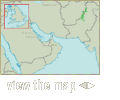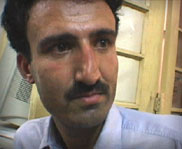|
+ "A Circle of Trust" 21 September, Islamabad
from Marcela Gaviria 
 Tonight we are expecting a visit from our Pashtun source, Hayat Ullah. He is coming from a small town in the tribal areas of North Waziristan, seven hours away from Islamabad, to tell us something that he is nervous about discussing over the phone.
Tonight we are expecting a visit from our Pashtun source, Hayat Ullah. He is coming from a small town in the tribal areas of North Waziristan, seven hours away from Islamabad, to tell us something that he is nervous about discussing over the phone.
I am watching the sun set over the lush green mountains that crop the Islamabad valley when he knocks on my door. He is wearing a light blue shalwar and looks sweaty from his long journey. He is handsome and tall, with a distinctive nose that sits perpendicular to his eyes. He almost looks like a Roman prince. His nose is stern and bold, but his eyes twinkle, and he flashes a smile that betrays his great kindness. After weeks of talking to this young reporter on the phone and a few occasional meetings, we have grown fond of this man.
We drive through the barely lit streets of Islamabad passing by multiple textile shops and carpet stores, and end up at a basement restaurant that serves Iranian food. It is one of the handful of quality restaurants in Islamabad where one can eat a meal outside the confines of a hotel.
We order a feast of crushed potatoes, pureed spinach, blended olives and shish kabobs over rice. We have much to talk about and find ourselves eating quickly and ignoring all table manners. Our friend eats like a tribesman. He prefers to leave fork and knife untouched and scoops up the food on the plate with a thin bread called a chapati. Our friend talks with his mouth full and continues, between sentences, to scrape off the meat of a lamb chop with his teeth. "I pressurized the tribal elder. I say, where did people go? We have long border with Afghanistan. If these people come to Pakistan, they are not from our area. They are foreigners. Where did they go?" He licks the bone he holds in his right hand.
 |  |
 |  |
 |
| Pashtun reporter Hayat Ullah Khan, who travelled into the FATA for FRONTLINE. |
 |
Most of the time we struggle to understand his English. We stop and ask each other the meaning of our friend's sentences. "Does that mean that the mullah helped transport the Arabs across to Miram Shah and into Peshawar? Or did the mullah only harbor the Arabs?" We take turns asking the same questions and enunciate each phrase. "Did the Arabs sleep in the madrassa?" When that doesn't work, we try another approach. "How many days were the Arabs guests of the mullah?" We try to verify the information by getting more details. "Could they be Chechens?" doesn't seem to get us answers. So we try, "Did they speak Arabic?"
I'm eating more than I should. I manage to keep the grease stains off my notebook, even though I never quite find a place to put the pad since the table is packed with nine shish kabobs, a mountain of basmati rice, and four Pepsis. Before we've cleaned our plates, we've pieced together a report of what we think happened in the tribal areas after the battles of Tora Bora in December 2001.
We learn that reports of hundreds of Al Qaeda being harbored and protected in the Tribal Areas are greatly exaggerated. Al Qaeda passed through but did not stay. There are reasons for this. The first is political. Tribal elders are savvy men who covet their independence from Pakistan's central government and would not want to risk an intrusion of troops on their land just to protect some Arab terrorists to whom they feel little allegiance. The second reason stems from the traditional Pashtun code, which says you protect only guests -- not fugitives who are passing through. The third reason is practical. Hiding Al Qaeda in such a deeply insular, communal region is practically impossible. What outsider can trust an entire village to keep his secret? There are rewards to those who rat you out.
Of course, this doesn't mean that the tribal areas are lacking in Al Qaeda sympathizers. Our friend points out, in a rare display of clear English skills, that there is a "silent majority" that is with Al Qaeda. But it's a deeply pragmatic society. The tribal areas bend with the wind and usually seek political expediency. If the Taliban are in power, they support the Taliban. If Musharraf is in power, they support Musharraf. Whatever it takes to protect your clan and your tribal land.
But we learn more. Much more. After days and weeks of sifting through pieces of information, we finally have a reasonable version of the trail of Abu Zubaydah -- bin Laden's chief of recruitment -- from the hills of Jalalabad to his capture in Faisalabad in March.
Based on this information, and some received in days past from a military source in Faisalabad, we estimate that Abu Zubaydah escaped from Tora Bora in the early days of December. Perhaps he sought refuge in the deep gorges that exist on the Afghanistan-Pakistan border. He may have made a few trips across the border to prepare for his journey to Pakistan, but it is likely that he crossed back into Afghanistan until all arrangements were in place. Abu Zubaydah's contacts in Pakistan seem to have paved the way for his journey. They raised some money and bought provisions. Then, sometime in February, Zubaydah crossed the border with a small group of Arabs. They slipped into the dusty Pakistani village of Mir Ali and reportedly stayed at the Bilal Madrassa for a few days. Muhammad Allam, Zubaydah's patron, encouraged him to move on before the tribal elders were angered. Allam faced having his house demolished if he was found out.
From Mir Ali, Zubaydah went to Miram Shah. And from there to Faisalabad. The tribal areas were never base camp, simply a place to stock up and move on.
We are enraptured by his tale. Martin jokes about facts too good to check. But it's all in jest. Seriously, we face a few dilemmas. First is how to verify the story. We have one reliable source: our friend. But he received his information from a tribal elder who has his own motivations. Perhaps this story was conjured up to tarnish Muhammad Allam's good name. Perhaps it is true. Second is a familiar dilemma faced by television journalists. How to get a principal source, either Muhammad Allam or a tribal elder, to go on tape and explain his version of events. With a ban on reporting about this area, we now have to "second source" or corroborate the story somehow else.
But the third dilemma is the one that unsettles us. What will happen to our contact if we report this story? Will this have repercussions? Will Allam take revenge? It is not a farfetched fear. Our friend has already been the target of a few grave threats.
Our friend reassures us not to worry. He does not seem worried himself. "They don't see FRONTLINE in the tribal areas," he says. Perhaps not, but it is unsettling. This young man has opened his world to us. He has taken many risks to report the facts.
As we finish our meal, our friend holds hands with Scott. He wraps his arm around Martin's shoulder. These gestures are meant to seal the friendship. We have entered this young Pashtun's circle of trust.

< previous dispatch + next dispatch >

|
London
(Aug. 13-14) |
+ Zubaydah Is Dead
13 August, London |
+ Armchair Jihadists
14 August, London |
Gulf of Oman
(Aug. 15-21) |
+ Faces at a Dubai Mall
15 August, Dubai, U.A.E. |
+ HMCS Algonquin
16 August, somewhere in the Gulf of Oman |
+ On Board the Algonquin
17-18 August, somewhere in the Gulf of Oman |
+ Like an Elephant Chasing a Mouse
17-18 August, Gulf of Oman |
+ Dubai to Karachi
20 August |
+ A Firehose of Information
20-21 August, Dubai - Muscat - Chennai |
Pakistan
(Aug. 22-29) |
+ Old Hash
22 August, Islamabad |
+ Nuclear Neighbors
22-23 August, Islamabad |
+ We Believe in God
24 August, Islamabad |
+ Paranoid in Peshawar
27 August, Peshawar |
+ Bombs or Dust Devils
27-28 August, Peshawar |
+ Rumors and Half Truths
28 August, Peshawar |
Pakistan Border Lands
(Aug. 30-Sept. 4) |
+ On the Road to Chitral
30 August, Dir Khas |
+ Prisoners' Dilemma
31 August, Dir |
+ In the Northwest Frontier
30-31 August, Dir |
+ Border Town
2 September, Chitral to Arandu |
+ Don't Go to Timargarha
1-2 September, Drosh to Timargarha |
+ An American Informer
3-4 September, Peshawar |
Pakistan
(Sept. 5-23) |
+ Road to Nowhere
7 September, Islamabad to Faisalabad |
+ Faisal Town
7 September, Faisalabad |
+ Frustrations
9 September, Faisalabad |
+ The Plight of Women
10 September, Faisalabad |
+ A Little Noticed Gun Battle
10-13 September, Lahore-Karachi |
+ The Madrassa
14 September, Akora Khattak |
+ The Next Big Get
20 September, Karachi - Islamabad |
+ A Circle of Trust
21 September, Islamabad |
+ Indomitable
23 September, Islamabad |
Saudi Arabia
(Sept. 24-Oct. 2) |
+ Inside the Kingdom
24-25 September, Riyadh |
+ My Baffling Question
27 September, Unizah-Buraydah |
+ An Obedient Dissident
27 September, Buraydah |
+ An Audience with the Crown Prince
2 October, Riyadh |
Yemen
(Sept. 25-Oct. 10) |
+ Arriving in Yemen
25-26 September, Sana'a |
+ The Wedding Party
27 September, Sana'a |
+ A Talking Drug
28 September, Sana'a |
+ The World's Most Ancient Skyscrapers
3 October, Sana'a |
+ Americans Are Vampires
7 October, Sana'a |
+ Waiting for Rahma
9 October, Sana'a |
|